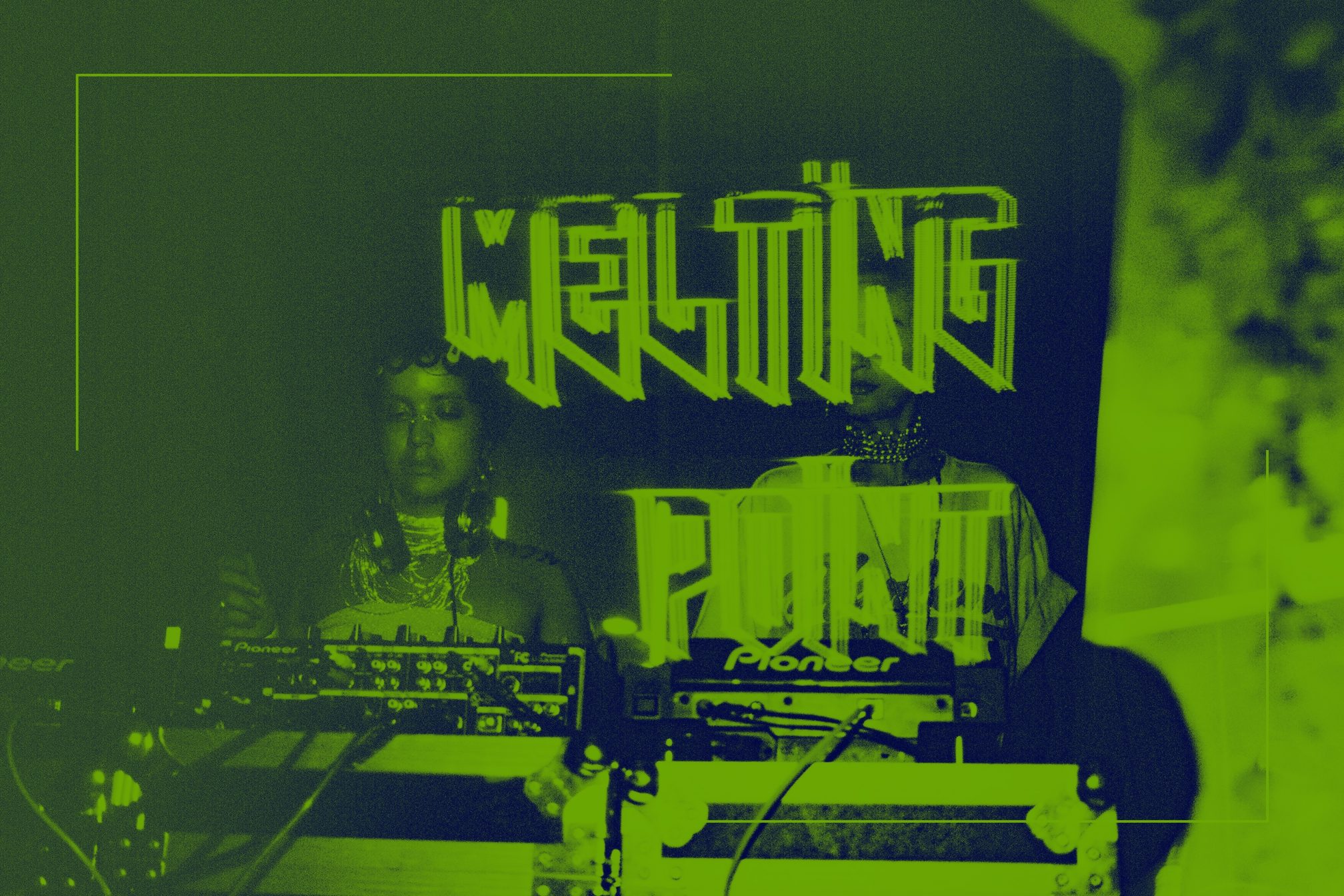 Features
Features
Melting Point is the NYC rave crew supporting immigrant rights
With a strong message of equality, the Melting Point crew is a driving force for change
Melting Point, an upstart Brooklyn collective, serves challenging music for challenging times. In nights that can slip between leftfield techno, rowdy noise acts, and reggaeton, the party channels rave escapism with punk’s confrontational edge to raise awareness—and direct cash donations—for immigrant rights. Last month, the eclectic crowd—chains, bleached hair, knee-high platforms, tattoos—took over the normally-staid club Elsewhere for an artistically radical evening. In the main hall, an unhinged Via App set skidded into the politically charged noise-rap of PsychoEgyptian, while hardcore techno classics sped in the back room. Later, a haunting live dance performance translated into projected motion-capture-visuals to accompany influential underground artist Total Freedom.
From closing a cavernous Gowanus warehouse complex at noon on New Years Day, to sweatily moshing at iconic Brooklyn DIY venue Market Hotel, the subset of Brooklyn rave kids that follow Melting Point gather not just for their love of electronic music, or to get fucked up; instead, the focus of the parties extends thousands of miles away to the U.S.-Mexican Border. While undoubtedly drawn to Melting Point due to their love for intense music (and looks), they share a penchant for something other than fast BPMs: politics.
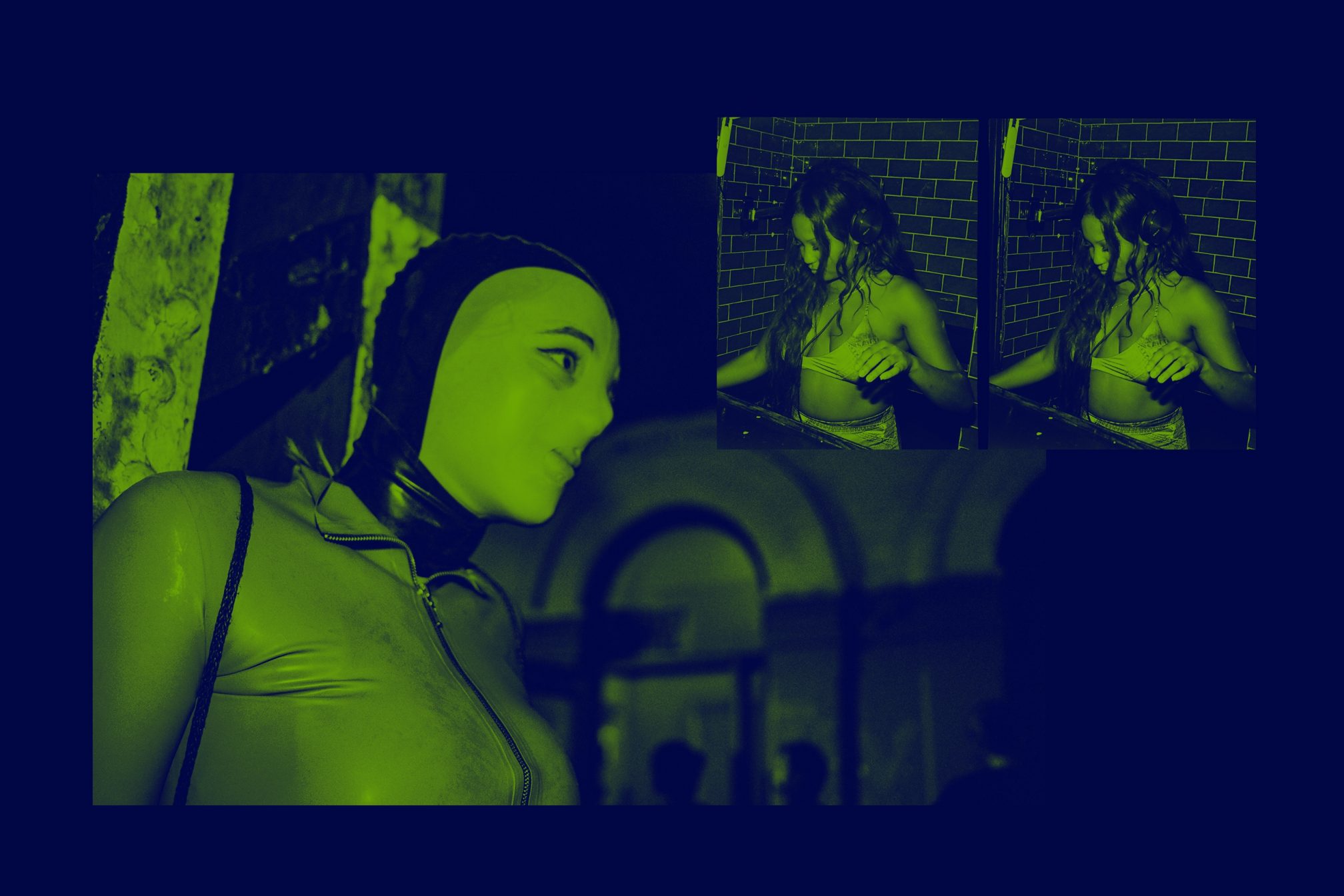
As the Trump Administration has ramped up its racist rhetoric in attempts to justify declaring a “national emergency”, authorities have been illegally turning away asylum seekers and inhumanely detaining migrants once on American soil. To draw attention to this injustice, Melting Point emerged noisily from the Brooklyn underground since last summer to organize a series of “fundravers” in support of Al Otro Lado, a non-profit providing cross-border legal defense, resources and humanitarian aid in Tijuana, Mexico.
“Our raves are a form of protest”, asserts co-organizer Eric Brian Stevens. While this might seem like a tired claim in the era of the nightlife-as-resistance narrative, few parties in New York place political organizing at the center of what they do with such consistency and primacy. Across Melting Point’s DIY flyers, art-videos and subway tags, no doubt is given as to their aim: “RAVE TO RESIST. SUPPORT IMMIGRANTS. MELT I.C.E.”.
Attesting to the scene’s appetite for a purposeful night out, Melting Point parties grew quickly from a first intimate affair headlined by LSDXOXO and Physical Therapy to a 15-hour rave attended by nearly 4000 partiers just months later. In the spirit of coalition building, Melting Point collaborated with seven collectives across five stages for this New Years party, propelling the massive crowd into 2019 with fresh experimental sounds (Yves Tumor, Machine Girl, Zakmatic) alongside early Hardcore titans like Lenny Dee of Industrial Strength Records.
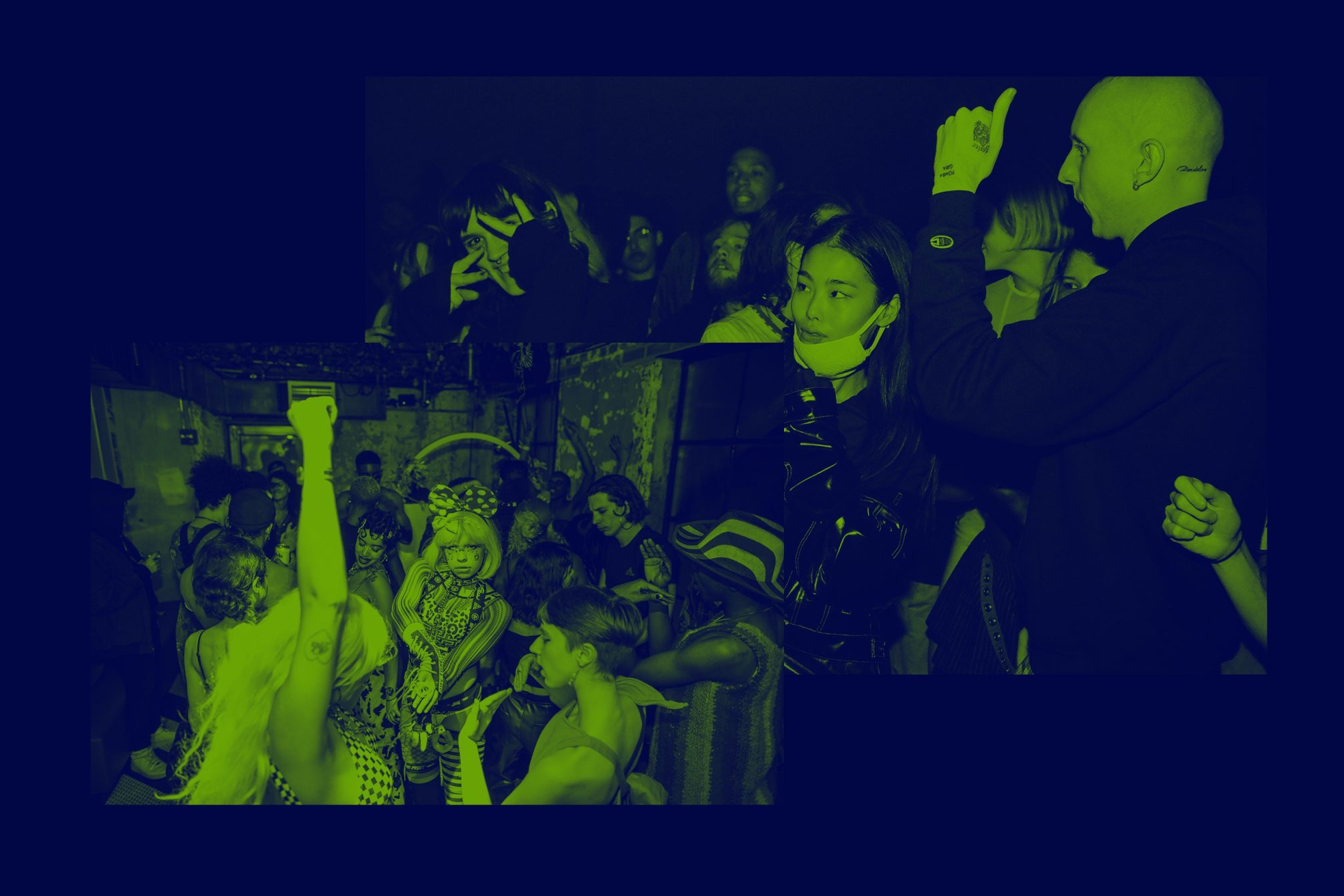
“In a moment where politics are so easily commodified in art and music” observes frequent Melting Point DJ Ashe Kilbourne, “it's exciting to see an event turning away from virtue signaling towards material support for activism”. While many parties announce their politics on their Facebook event page, Eric underlines that Melting Point seeks to “reclaim nightlife as a more focused space for political resistance and action”.
Material support for activism comes in the form of the tens of thousands of dollars donated to AL Otro Lado, but also in Melting Point’s sustained support of minority artists in New York. The collective’s “unapologetically diverse spirit” shows in both what they book and whom they book. Building off many personal connections to the burgeoning underground scene in Mexico (check out resident DJ Zakmatic’s mix for NAAFI), the collective first arose in response to a simple question acknowledging their relative resources and privilege to act: what can we do?
“When minorities, immigrants, or people with marginalized bodies of experience share their distinct stories through their music, it allows them to be heard, and sets an example for those with similar identities who might be longing for mobility and an outlet for expression” reflected Arielle Herman, the multimedia producer, singer, songwriter, and new media artist behind Qualiatrik after her Melting Point appearance last fall.
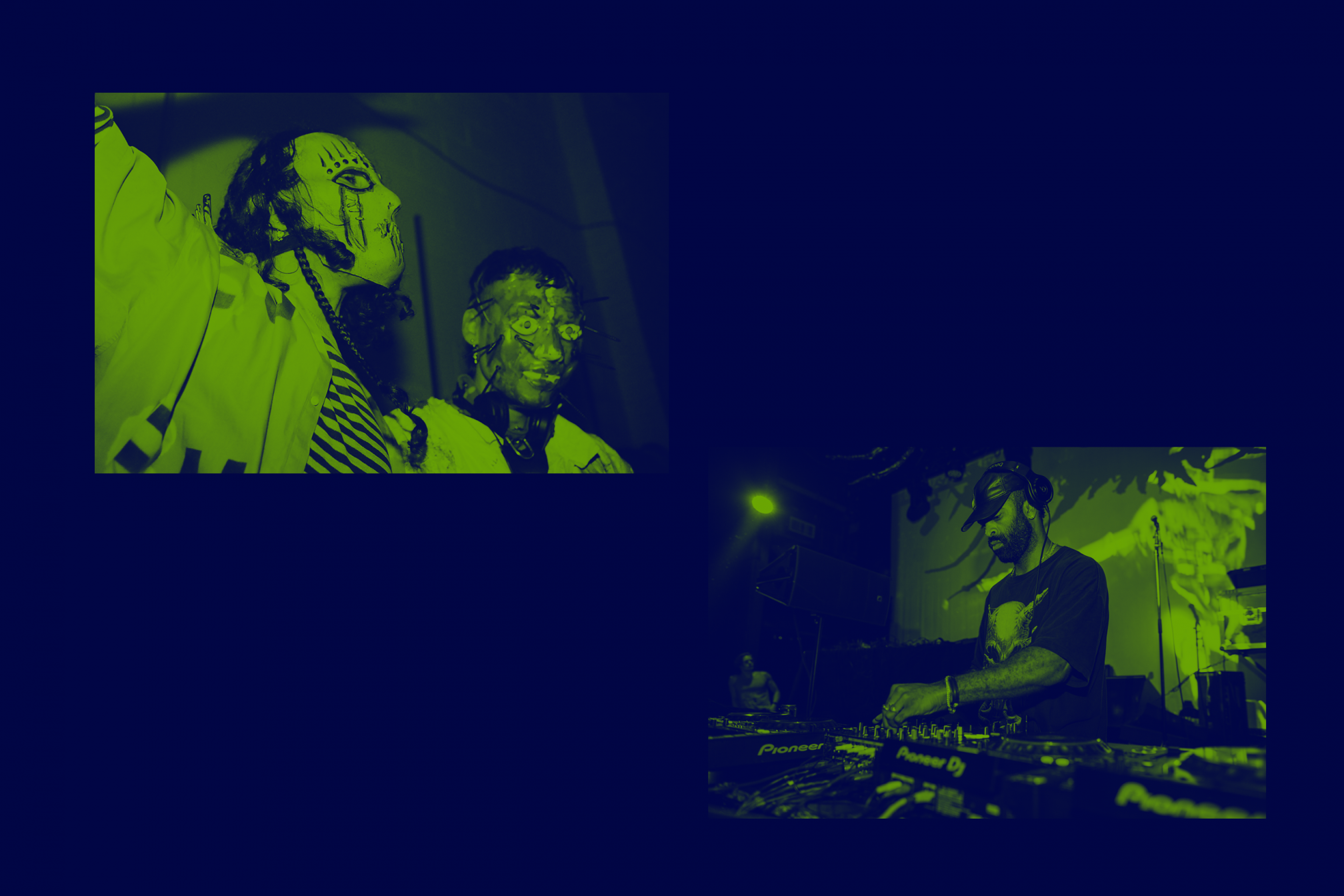
For New York City audiences accustomed to committing a night to their choice subgenre, Melting Point strives to break down musical silos. The sonic breadth is impressive (and at times jolting): noise, dembow, hardcore techno, punk, trap, electro, reggaeton, jungle, tribal, ballroom, baile funk. As a platform uplifting local artists whose identities are under threat in the current political climate, Melting Point brings national politics to the local scene and then turns around to mobilize around national politics. Reflecting on the parties, industrial noise-punk duo Deli Girls admit: “you feel that everyone at an event is your unspoken ally, no matter what your identity is—and that shit is everything”.
Politics even inform the visual art installations that deliver a fundamental part of Melting Point’s identity. Cole Carter, another organizer, sums up the world they curate as a “futuristic dystopia set in resistance”, yet “illuminated by beautiful light and vitality”. While this high concept may oversell the reality of what’s possible for a one-night DIY production, these artistic elements—like light collective Nitemind’s mesmeric strobes, or the gargoylesque foam sculpture by artist vvxxii that floated above the Elsewhere stage last month—signal a commitment to progressive art that match their progressive politics.
Digital artist Sam Rolfes, who has produced trippy video work for the collective (including the aforementioned live-motion-capture 3D visual performances), considers building imaginative nightlife spaces an important escape mechanism for marginalized communities “to come together and revel in a fantasy space just slightly extracted from their painful day-to-day reality”. Yet, as former GHE20G0TH1K resident Marco Gomez (AKA False Witness) quips while reflecting on his own queer and latinx identity in Trump’s America: “art can only imagine the future—we still need to bring that future into existence”.
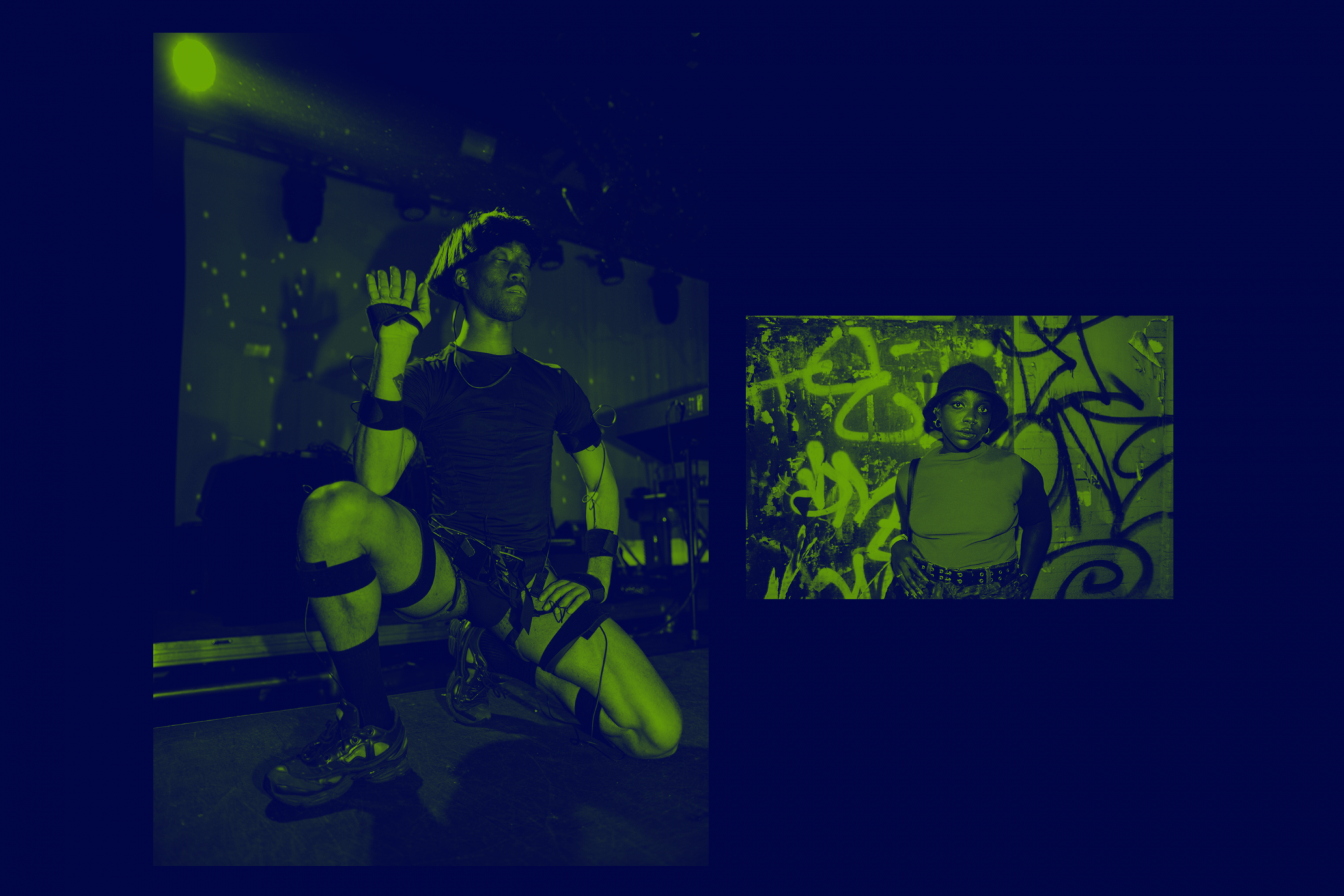
While the toxic, anti-immigrant messaging of the current administration first called Melting Point’s team to action, a trip by several to Tijuana to deliver aid and meet with Al Otro Lado this winter reinforced in their minds the radical potentiality of building support links between marginalized communities on the Border and in New York through nightlife. Witnessing how the organization—understaffed and underfunded—performed their urgent work daily despite threats, it hit home to collective leader Brytani Caipa how Melting Point’s efforts in Brooklyn “aid thousands of asylum seekers and fighting human rights violations being committed by the U.S. Government”—a real, material #resistance.
Even as underground genres have become big business, a popular myth lives on promulgating how electronic music scenes are inherently radical due to their origins in marginalized communities. However false this presumption, perhaps such a myth can still have a useful role to play if it is actually made true through progressive action, reflection and inclusion by artists, promoters and party-goers . “Approaching nightlife as a purely hedonistic and vapid celebration de-weaponizes what could be a space for change” emphasize the organizers. While nightlife is many things, Melting Point argues that in 2019, in America, it can and should be political too.
Melting Point hosts their next fundraver for Al Otro Lado on May 24th at Market Hotel in Brooklyn. @meltingpointnyc
Eric Brian Stevens, an organizer of Melting Point, had the chance to interview and snap portraits with several of the artists from the Melting Point community. Scroll through their thoughts and personal experiences with immigration issues in the United States today, as well as the influence of music, art and community in activism::::

Riobamba is an Ecuadorian-Lithuanian producer, DJ and cultural activist based in Brooklyn
“The immigration crisis is urgent and it's essential to continue humanizing the issue, because the Trump administration wants nothing more than to criminalize depictions of immigrants that are seeking safety and security for their families, coming from places that the United States has destabilized.
"As an artist, I feel the need to address social responsibility because these issues directly affect my family, my friends, my community, and the greater, interconnected network of human communities. No one is free if other people are suffering. As a DJ representing my own Latinx, first generation perspective, I refuse to make the cognitive disconnection between the music I play and the communities that this music comes from, who are disproportionately affected by this crisis.”
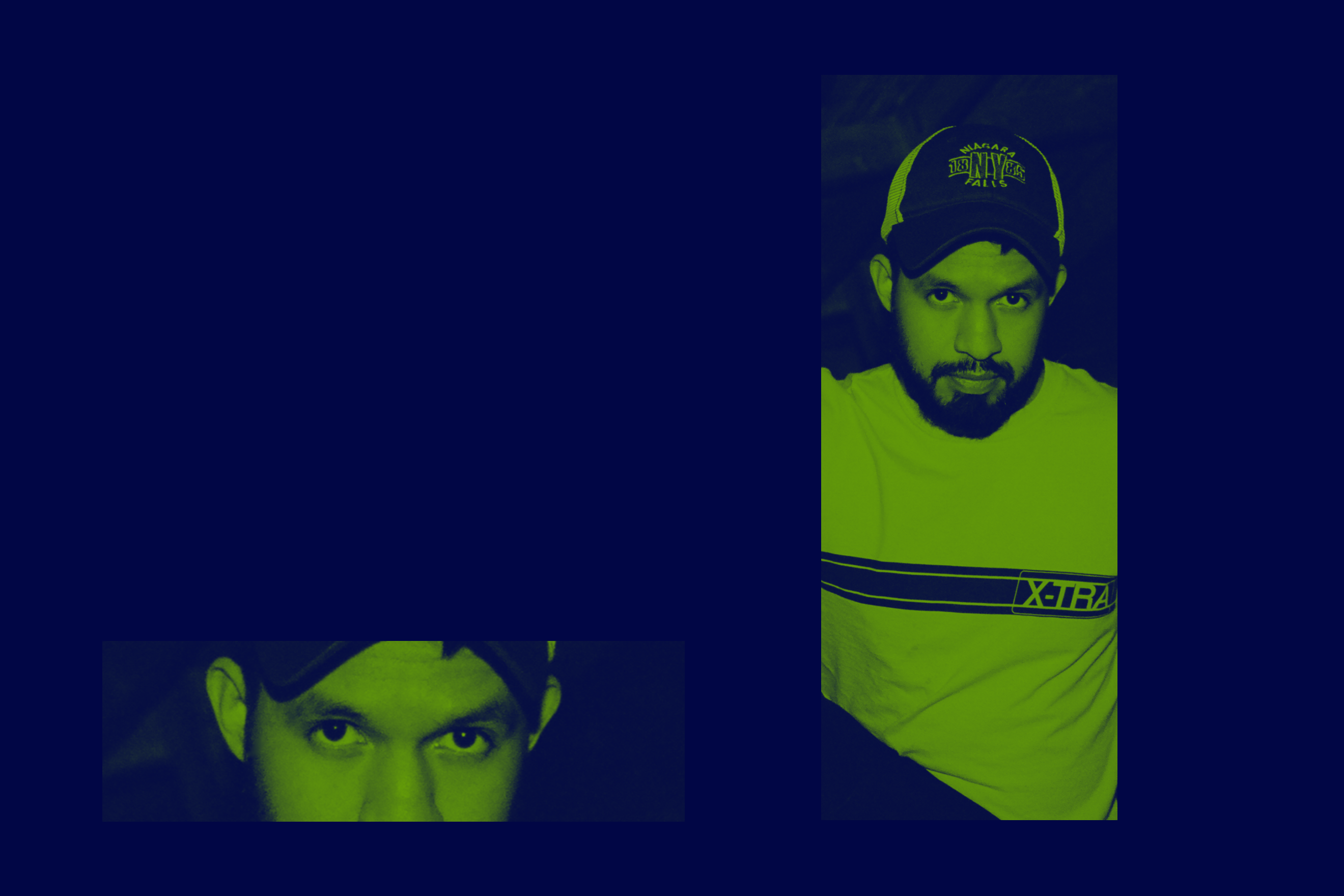
False Witness is a multimedia artist, composer, and New York City nightlife staple
“The political climate of 2018 and the current global refugee crisis is something that my colleagues and I once predicted years ago. It's also an issue that impacts my friends and family personally today. I'm here in California with family members who have been directly affected by deportations and a foreign policy that treats my people like second class citizens.
"As an artist, I don't make explicit gestures in my work that call upon my heritage or identity: simply existing and surviving as a queer Latinx artist should be enough. Frankly, my heritage and identity was stolen from me from birth by U.S. imperialism. I won't get that back without it having some kind of neocolonial shade or damages set upon it, so I look elsewhere.
"I look to art making as a way of promoting futurist perspectives: a means of imagining a better world without Trump's, Bolsanaro's, Ergodan's, Duterte's, Netanyahu's, Putin's, or despots in general. I make electronic music, which is a style of music that has transcended borders for decades. I like the idea of a borderless Earth.”
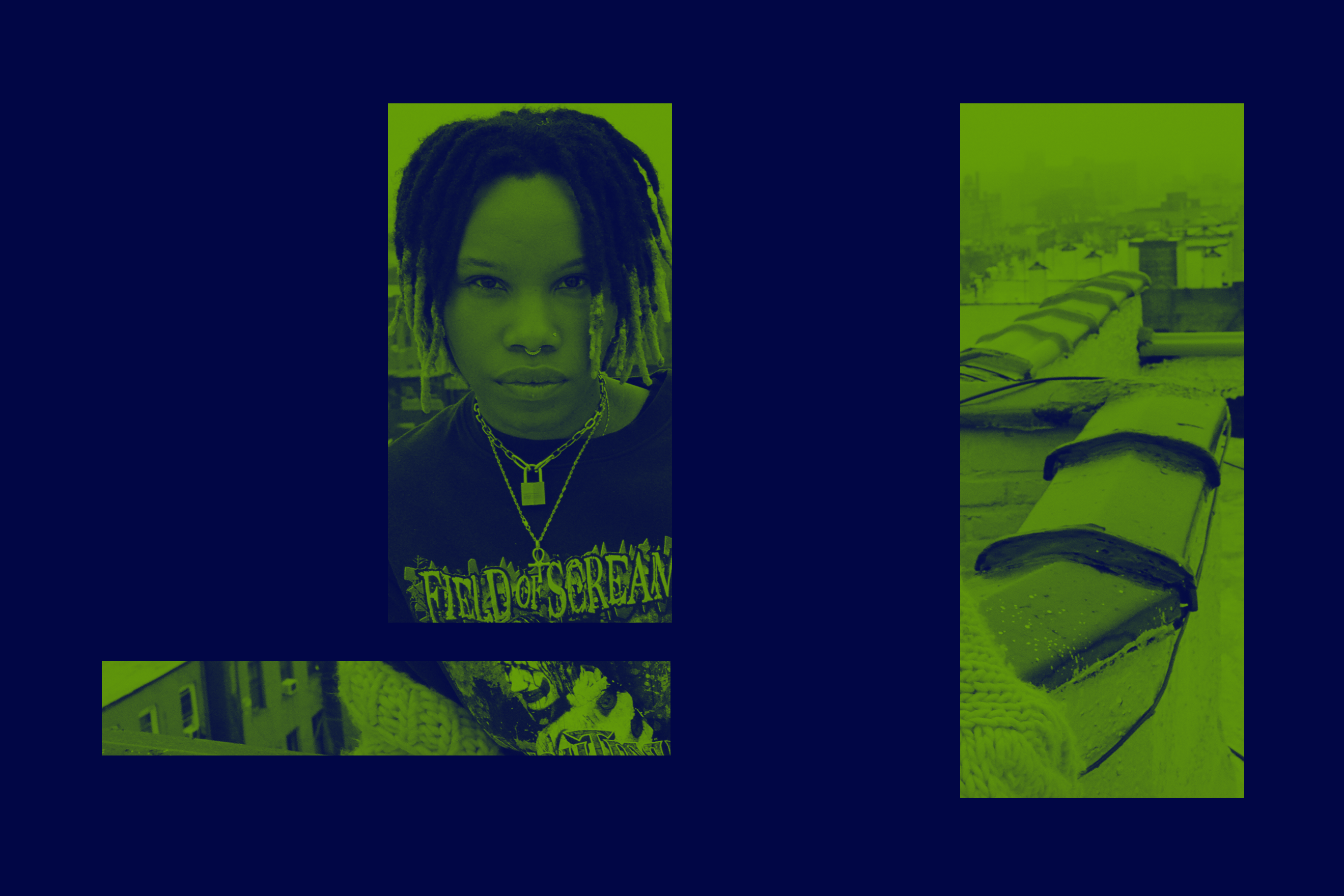
Tygapaw is a Brooklyn based Jamaican immigrant, who has been a formative part of the queer underground scene in Brooklyn and founder of Fake Accent label
“As an immigrant living in America for 16 years, it goes without saying these are challenging times for us. What I’ve learned from America during my time here, which I spent several of those years as undocumented, is that I do not have a voice, not one that will be heard. If we speak out against racist and xenophobic rhetoric from the government, we fear as a result we will be prosecuted by said government because the constitution does not seem to protect us. So this silencing takes place and I’ve felt for a long time like I have no agency here in America, and this has been proven to be true in my experience. Being a black and brown immigrant is to feel this overwhelming feeling of uncertainty and the anxiety that comes with that is at times unbearable.
"This is not a life I wish for anyone, and my greatest desire is to help effect change. But I feel helpless because as a black immigrant in America, I’ve been taught that I’m insignificant and my life does not matter all because of the color of my skin. It’s quite a hellish experience when you read these words from the Declaration of Independence “We hold these truths to be self-evident, that all men are created equal, that they are endowed by their Creator with certain unalienable Rights, that among these are Life, Liberty and the pursuit of Happiness.”, but these words seem to only apply to fairer (skin/complexion) of the American population, not for the people who look like me. It truly is heartbreaking.
"It really is up to Americans to effect the change we so desperately need. You have all the rights. If you care please exercise those rights on our behalf. Every vote counts, use that power that we don’t have for the greater good.”
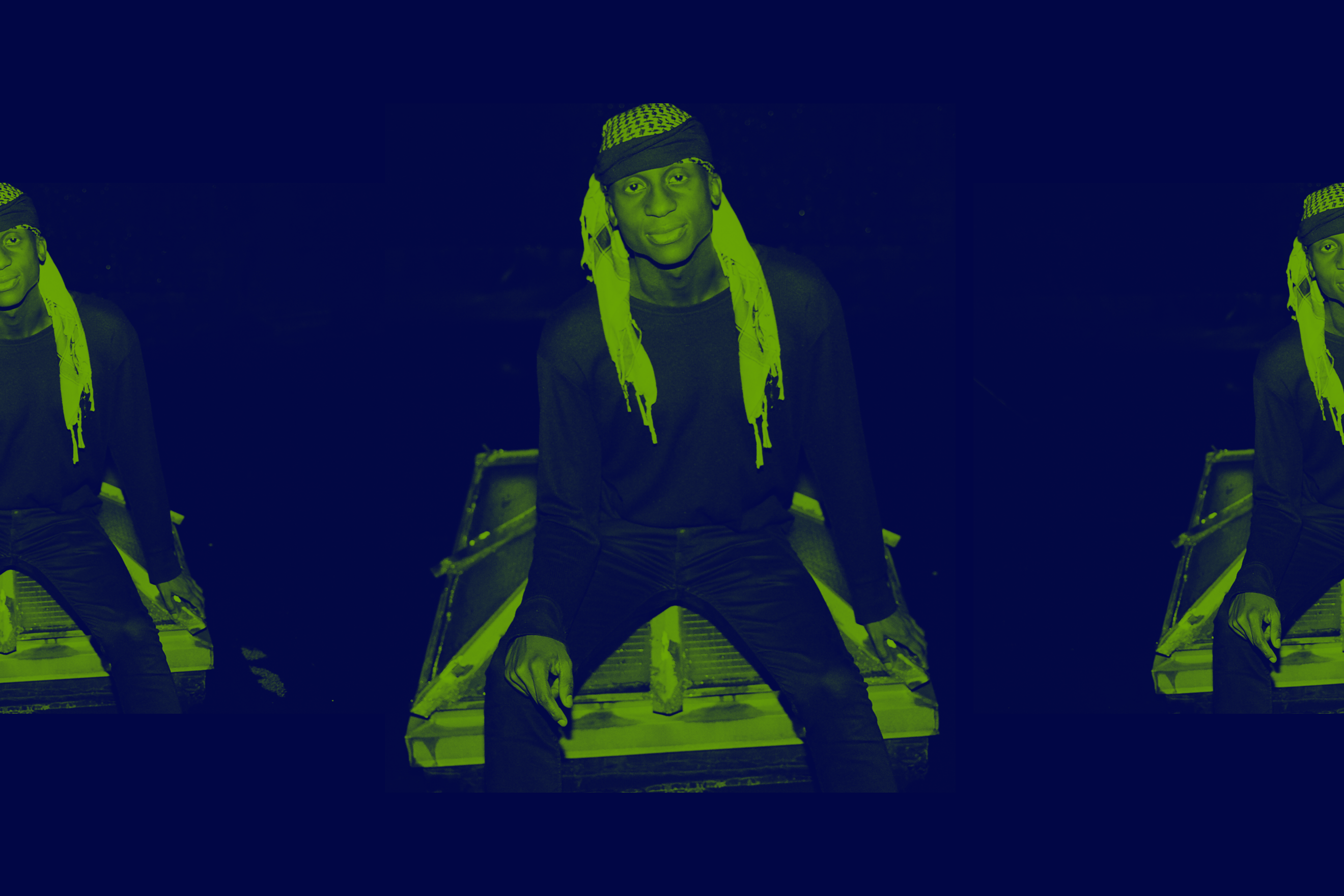
Skyshaker is a NYC Ballroom legend, who has worked with GH320G0TH1K, Qween Beat, and FUTUREHOOD
“As a leader of the international House and Ballroom community, immigration discourse comes with the job. For many, there is no greater opportunity than to attend American balls and take classes from legendary ballroom figures. As a result, grad prize money won at balls outside of America is often set aside to pay non-immigrant US visa fees. When it comes to my time in Latin American ballroom, these conversations carry a different weight. Concerns of ICE and questions of asylum are at the forefront in a way that brings the plight of the undocumented into start focus. Although seeking asylum must not be confused with the journey of seeking citizenship, both conversations clearly must be better understood among the voting public.
"After four years of traveling to countries most directly affected by the antics of the current president, a twist of fate at the end of my Autumn tour brought me face to face with an artery of the Tijuana-bound caravan dominating headlines worldwide. Even today, compassion is the only word that can do my thoughts justice. Witnessing an exodus in any capacity is a memory that won’t leave easily. While lobbying for new legislation is one thing, Melting Point is on such effort that can be commended for keeping the conversation evolving.”

Kilbourne is the hardcore, industrial terror aggro fem project of New York producer Ashe Kilbourne
“It's tempting to categorize the violence towards Latinx people and immigrants as 'new', or to personify it through the president, but enforcing borders has always been about killing people and preserving the goal of a white nation, and will be long after Trump. The best way I know to respond is giving money and resources to groups like Al Otro Lado, and I'm super grateful to Melting Point for providing an outlet for that.”

Qualiatik is the multimedia project of producer, singer, songwriter, and new media artist Arielle Herman, who began making music while studying neuroscience
"Music is a way for people to tell their stories. Listening and connecting to someone’s music is a humanizing, universal introduction to another person’s world.
"The scale of this potent exchange is magnified when an artist is given a platform to perform live. There is little more humanizing than watching someone as they tell their own story—as they live in its details through their expression, in the very body that experienced it. The structural dynamic of the performer–audience relationship places the performers in a position where they can be celebrated and heard. Occupying this role creates a powerful avenue for personal stories of struggles and triumphs, and validates these experiences in a tangible way.
"Familiarity defeats fear, and many of the political movements we observed this year were fear-based gestures, clearly the products of ignorance and susceptibility to stereotype. Humanizing, individual stories have the power to invalidate this fear and break down the wall between an individual and a generalized concept. For that reason, I think the more bombarded those of ignorance are with humanistic images and narratives of the communities they fear, the more we will work toward unity and understanding, or at least human coexistence."

Zakmatic is a Colombian American DJ/producer with a uniquely abrasive and euphoric sound
“As a witness to displays of cruelty and inhumanity towards the Latin community and towards all minorities, it is not hard to feel the suffocating weight of despair and helplessness. As an artist I feel it would be a crime to not do my best in aiding the disruption of these acts of pure evil committed against our brothers and sisters at the borders. Using my voice to disrupt and destroy is the only way I am able to sleep at night. It is inspiring to see so many people in the community also sharing these sentiments. Our voice will only grow louder if we come together.”
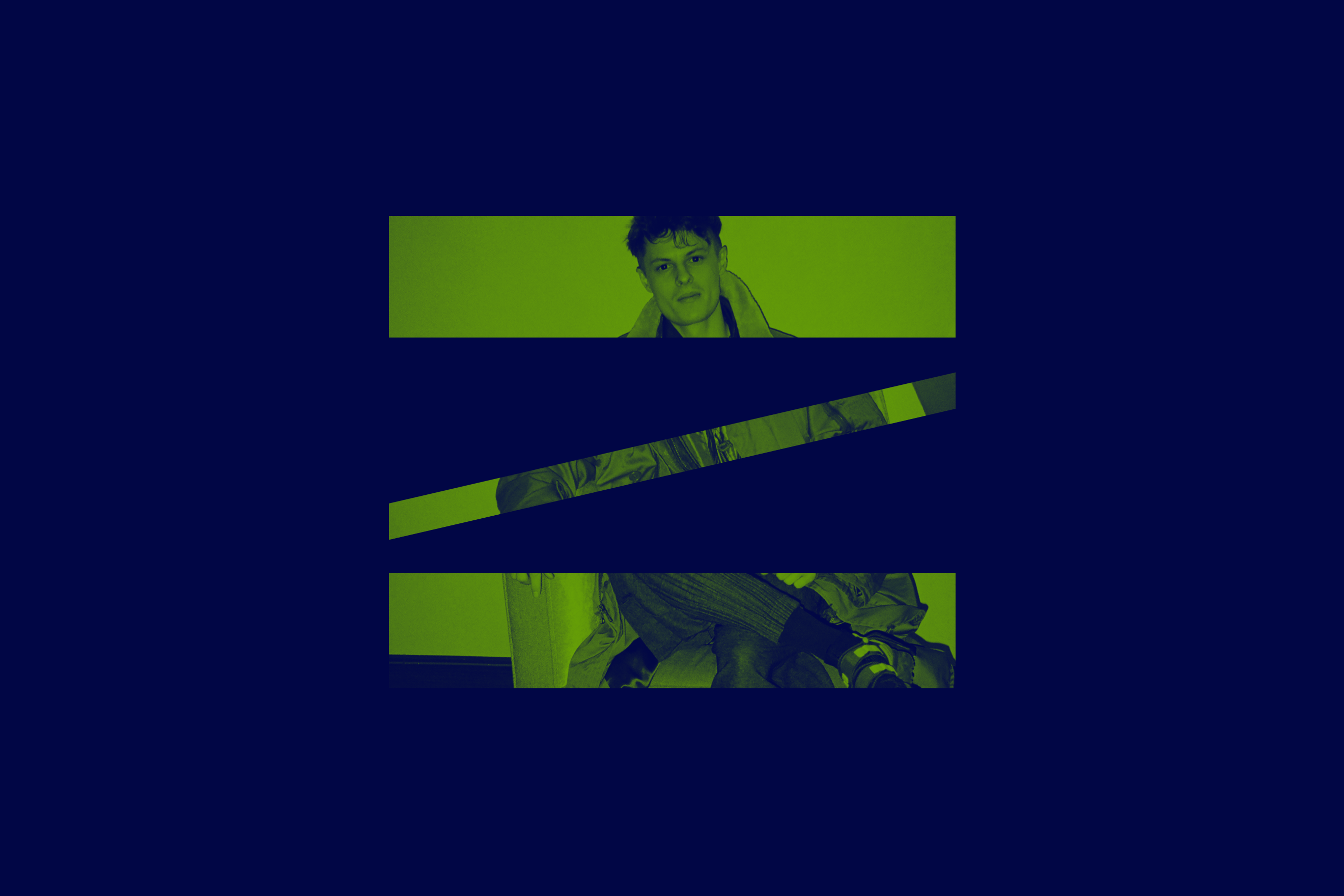
Sam Rolfes is a multi-format visual artist, graphic designer, experimental electronic musician and sound artist
"The last few years have been a conscious effort on my part to both understand and grapple with the domestic class divide and imperialism abroad that I'd been largely blind to. Since then it's been a matter of slowly piecing together a foundation of an art practice and lifestyle that doesn't ignore this reality; one which actively works to actively challenge those structures as materially as possible.
"I will say however that we cannot expect the huge brands sponsoring us to facilitate this. A truly progressive art form absolutely has to tackle class division and wealth inequality and your slick Intel or Google artist residency is very very unlikely to support this in a real way. Brands will happily support progressive identity politics to the extent it can be monetized, but if that's all you have to offer, I don't see that having any material benefit to the situation of marginalized communities."

Deli Girls is a queer electronic noise-punk duo known for their rowdy live sets
“It’s been really inspiring seeing our community start to be more conscious and give back to the neighborhood it takes up space in--being in a position to help at all is humbling.We are so excited to see the scene beginning to take an interest in transformative and restorative justice and do more for each other; I think these are ultimately the kind of goals Melting Point, and other members of our community have been vocalizing and working towards. We are all allies to those who are affected by unjust immigration policies and those who are at risk due to the political situation. Intersectional feminism is a priority in our community, and there has been a noticeable shift in focus on this individually and as a group. The work is invaluable because if we don’t all help each other no one will.”
Read this next!
75 global rave flyers from the largest flyer archive in the world
New York Rising: How Brooklyn became one of the world's best clubbing destinations
Listen to the official soundtrack for the coming-of-age rave film 'Beats'


